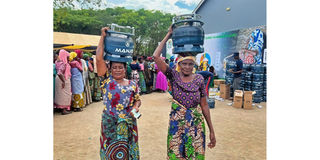Prime
Researchers and policymakers unite for clean energy future

What you need to know:
- This initiative comes as Tanzania continues to grapple with the heavy reliance on biomass fuels for cooking—a staggering 85 percent of the population still depends on firewood and charcoal
Dar es Salaam. In a move that experts believe could accelerate Tanzania’s transition to clean energy, researchers and senior government policymakers have sealed a collaborative pact aimed at delivering evidence-based reforms to fast-track the country's clean cooking ambition.
This initiative comes as Tanzania continues to grapple with the heavy reliance on biomass fuels for cooking—a staggering 85 percent of the population still depends on firewood and charcoal, according to government estimates.
The resulting emissions not only endanger human health but also undermine the country’s environmental and climate targets.
Speaking at a workshop hosted at the University of Dar es Salaam (UDSM) on July 27,2025, as part of the Inclusive Green Economy (IGE) programme, Deputy Commissioner at the ministry of Finance, Dr Remidius Ruhinduka, emphasised the urgency of this partnership.
“Energy plays a pivotal role in achieving development objectives, particularly in improving citizens’ quality of life while safeguarding the environment. If we want to reduce emissions by 2030, there must be a shared understanding between researchers and policymakers,” Dr Ruhinduka said.
The event also marked the graduation of the programme’s first cohort of civil servants, who, over the past year, have worked alongside researchers to tackle the theme of “Energy Efficiency and Reduced Emissions” under the IGE initiative. Funded by the Swedish International Development Cooperation Agency (Sida), the IGE programme has been implemented since 2021 across five East African countries—Tanzania, Uganda, Kenya, Rwanda, and Ethiopia.
In Tanzania, it aims to build capacity within ministries and government agencies to formulate sustainable policies grounded in research and economic-environmental policy instruments.
“In the past, there was a significant gap between policymakers and researchers. Researchers had solutions, but decision-makers were unaware of them. Through IGE, we have successfully bridged this gap,” said the IGE Lead in Tanzania, Dr Aloyce Hepelwa.
According to Dr Hepelwa, this collaboration has already resulted in policy reform recommendations that will serve as catalysts for improved clean energy advocacy at household level. The ministries involved in this cycle of the programme included the Ministry of Energy, Ministry of Finance, Ministry of Industry and Trade, Ministry of Transport, and the Rural Energy Agency (REA).
“The aim is to promote the adoption of energy-efficient domestic appliances and identify strategies to improve policy enforcement,” Dr Hepelwa added.
The collaboration aligns with Tanzania’s broader energy reform agenda, which includes the recently launched National Energy Efficiency Strategy (2024–2034). The strategy seeks to: Enhance energy security, promote innovation, reduce poverty and mitigate climate change.
These reforms, according to Dr Ruhinduka, are essential if the country is to realise its 2030 emissions reduction targets, as committed under international climate frameworks.
Yet, despite this ambitious policy landscape, the uptake of clean cooking technologies remains low. According to experts, this is due to a combination of factors including lack of awareness, high costs, and cultural preferences.
“Even though electric cookstoves are available, many Tanzanians are unaware of their benefits. There are companies offering incentives for electricity usage, but the public response is still minimal,” noted an environmental expert from the Vice President’s Office-environment, Mr James Choyi.
Mr Choyi, who is also among the first cohort of the programme, stressed the importance of providing consumer incentives and strengthening community-level awareness to complement policy-level reforms.
Research-backed policies for vision 2050
The IGE model could serve as a blueprint for other national goals, including Tanzania’s long-term Vision 2050, which seeks to transform the country into a middle-income, climate-resilient economy.
“We have trained policymakers to use economic policy instruments to design impactful, evidence-based strategies that support economic growth without harming the environment,” Dr Hepelwa noted.
Experts argue that embedding research into every phase of policy development—from agenda-setting to evaluation—will ensure that Tanzania’s development efforts are both inclusive and sustainable.
“This partnership is not only timely, but it is critical for ensuring that our climate targets are not just political promises but achievable goals rooted in science,” said a clean energy researcher from Ardhi University, Dr Magdalena Peter.
As Tanzania continues to champion clean energy—both regionally and globally—the success of the IGE programme highlights the power of collaboration.
Stakeholders are now calling for continued funding, scale-up of the initiative, and institutionalisation of researcher-policymaker networks across all sectors.
“Our ambition is to see all policy reforms informed by data, and more importantly, designed by people who understand both the science and the systems,” concluded Dr Ruhinduka.





